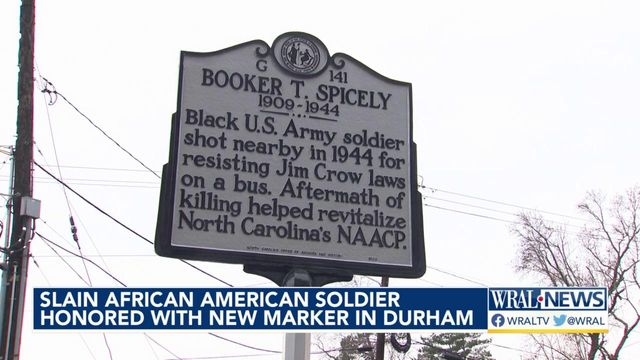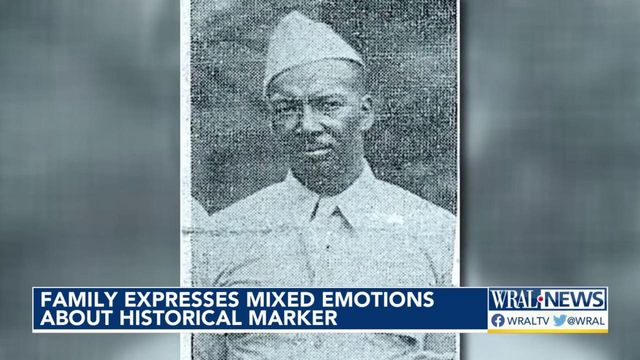Before Rosa Parks: Black veteran shot to death for refusing to sit in segregated section of bus in Durham
Before Rosa Parks, there was a veteran riding on a bus through Durham who took a stand against racist Jim Crow laws – but he did not survive his action.
Private First-Class Booker T. Spicely, a Black soldier who was killed for protesting Jim Crow laws, was honored with his own historical marker on Friday – a day which would have been his birthday. His marker now stands at the corner of West Club Boulevard and Broad Street.
"It's been like a circle of feelings," Cynthia Mitchell, a descendant of Spicely, said. "I can't even wrap my head around what a mother is feeling to have something like that happen to her child and the man who lived it is just living his best life."
Mitchell says Spicely was her second cousin.
In 1944, Spicely, stationed at Camp Butner, boarded a Durham city bus operated by Duke Power Company. Spicely refused to sit in a segregated section of the bus and got off the bus at the intersection of West Club Boulevard and what is now Berkeley Street.
The white driver, Herman Lee Council, chased Spicely off the bus and shot him twice at close range in front of other passengers.

Watts Hospital, presently the North Carolina School of Science and Mathematics Durham campus, was two blocks west. Spicely was denied care there because of his race and was taken to Duke Hospital, where he was declared dead upon arrival.
"It seemed such a horrible act that there was no accountability and not only that, it was lost to history," said James Williams, who is on the Booker T. Spicely Committee.
The history he says he felt was time to bring to light not just for all the other Black soldiers unjustly killed but also for Spicely's family.
"I think this means so much to them that we care enough," Williams said.
Spicely's death sparked outrage and galvanized the North Carolina NAACP. His actions were a precursor to the renowned bus boycott in Montgomery, Alabama, sparked by Rosa Parks' refusal to yield her seat.
"I will certainly continue to share the story," said Williams.
Mitchell also says she hopes the marker will help people remember Spicely's story – and inspire then to be courageous enough to stand up for what's right.
Duke Power Company continued to employ shooter, acquitted by all-white jury
After the fatal shooting, Council was arrested and charged with second-degree murder.
The Duke Power Company, who owned and operated the local buses, paid Council's $2,500 bail. Despite the severity of the charge, Council was permitted to drive his bus until the trial.
At trial, an all-white jury acquitted Council after only 28 minutes of deliberation.
The power company continued to employ him but switched his route.











